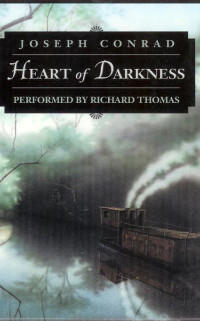Recently, I have read the novel Heart of Darkness by Joseph Conrad. I certainly have enjoyed reading the book, with all its deeper meanings and its symbolization. For example, the construction of light and darkness in this novel is obviously clear. Light normally indicates civilization and self-knowlegde, while dark usually represents wilderness, ignorance and evil. Joseph Conrad tries to tell us something wise about the nature of humans' heart. He does this through his obscure theme of darkness in this novelette.
What does darkness mean? You might think that darkness in this novella refers to the heart of the Congo and to the African people who lived in ignorance. This ignorance surely is a concept of darkness, but it is an external one. On the other hand you can look at darkness from another aspect that is full of deep meanings. It is not the African wilderness, but the wilderness in a white mans heart. That is why the voyage Marlow makes, is not just a nice story written by Conrad but a claim to all white people, for destroying the earth. The voyage of Marlow lets people see what they have done wrong, and also what they are still doing wrong now. Reading the book is actually the exploration of the self.
In a very old issue of Elseviers magazine I have read an article, which criticized Joseph Conrad for the use of racism in Heart of Darkness. In this essay I would like to discuss whether I think that this is true or not.
First of all, in Heart of Darkness the river Congo is compared to the river Thames. Marlow is telling the story while they (the other people on the Nellie stand for the reader) are sitting at the bottom of the Thames. Yet this story takes place on the Congo. Right off, there is a comparison between the two rivers, says the article. The Thames is suggested as a peaceful river, while the Congo has a completely different atmosphere. I think that in saying that Africa is the darkness, you are missing the point. Africa is the darkness on the outside. The Englishmen who go to Africa and are colonizing there, are the ones who are dark and inhuman. They are greedy and have become dark, like the appearance of the Africans. Perhaps the ‘darkness’ of the Congo has brought out that animalistic instinct. All that the Europeans can think about is money. Conrad himself gives a very good illustration to my point of view on this issue: ‘the sepulchered city.' Brussels looks clean and white from the outside, but inside the house's crime is organized. The crime that is being organized is the export of ivory and the abuse of the natives in Congo. (However the natives are not being exploited by Kurtz.)
To continue, the article claims that the attitudes and opinions of Marlow, which can sometimes be quite severe and racist, are also the philosophies of Conrad. On the other hand one could mention that Conrad, rather than agreeing with Marlow’s attitude, might be holding it up to irony and criticism. There are many layers between Marlow and Conrad in the "story within a story" theme. I think that if Conrad really wanted to separate himself from his character, he would have chosen an other frame of reference in which the reader could have judged the actions and opinions of his characters. Also, the article says that Conrad is Marlow because of the similarity between their careers.
The article wants us to accept this as a fact without any confirmation. I believe that Marlow is drawn with a sort of sarcastic irony that, though quiet, distinguishes Conrad from his character. An example of the humor put into the character is the description of Marlow as resembling an idol who sits like a European Buddha.
"Mind," he began again, lifting one arm from the elbow, the palm of the hand outwards, so
that, with his legs folded before him, he had the pose of a Buddha preaching in European
clothes and without a lotus-flower…"
Marlow also claims to be very against telling lies, and yet he does so himself in at least two situations. Here Marlow convicts the Roman conquest and contrasts it with European colonialism:
"What saves us is efficiency – the devotion to efficiency. But these chaps were not much account really. They were no colonists, their administration was merely a squeeze…. They were conquerors, and for that you only want brute force – nothing to boast of, when you
have it, since your strength is just an accident arising from the weakness of others. They grabbed what they could…. It was just robbery with violence, aggravated murder on a
great scale…. The conquest of the earth, which mostly means the taking it away from
those who have a different complexion or slightly flatter noses than ourselves, is not a
pretty thing when you look into it too much. What redeems it is the idea only. And idea
at the back of it, not a sentimental pretence but an idea; and an unselfish belief in the idea…." This quotation shows the obvious separation between the author and the character because the rest of the story shows that the conquest of the Europeans was actually worse than the conquest of the Romans, which goes against Marlow’s claim above. Marlow is further separated from Conrad because of the view of the "glorious sailors" proudly talked about by Marlow. These sailors were, in reality, no better than pirates and plunderers. To end with I would like to mention Kurtz. Toward the end of the story, Kurtz’ mistress is seen along the shore and Marlow goes into some length describing her appearance. "She was savage and superb, wild-eyed and magnificent…. She stood looking at us without
a stir and like the wilderness itself, with an air of brooding over an inscrutable purpose." Conrad describes her in such detail because she is in her place and she is an important savage equivalent to the refined, European wife of Kurtz that we hear from only at the end of the story. I do not agree with the article about Kurtz’ mistress. As they say that she is a person of significance in the racism of this novella. Conrad presents a different picture of the European woman where she is not so beautiful and magnificent, but rather pale and weak. I think this actually is not an example of racism. When black people are portrayed weaker than white people I think you may speak of racism. In this situation Kurtz’ wife is evidently less imposing than the native woman. I think I did well in proving the article wrong. It probably was written by someone who did not enjoy the book, or who sees racism in everything. For example the Dutch ‘Sinterklaas’ and his black ‘Piet.’ People now think that this event, that is similar to Santa Claus, is discriminating towards black people. Because ‘Piet’ is a servant. However ‘Sinterklaas’ is just a story made up to keep children sweet, and has nothing to do with racism. The article should have been better thought about before it was placed. I enjoyed Heart of Darkness very much and I did not see any racism in it. Sources of information · The Internet · Elseviers Magazine
that, with his legs folded before him, he had the pose of a Buddha preaching in European
have it, since your strength is just an accident arising from the weakness of others. They grabbed what they could…. It was just robbery with violence, aggravated murder on a
great scale…. The conquest of the earth, which mostly means the taking it away from
those who have a different complexion or slightly flatter noses than ourselves, is not a
pretty thing when you look into it too much. What redeems it is the idea only. And idea
at the back of it, not a sentimental pretence but an idea; and an unselfish belief in the idea…." This quotation shows the obvious separation between the author and the character because the rest of the story shows that the conquest of the Europeans was actually worse than the conquest of the Romans, which goes against Marlow’s claim above. Marlow is further separated from Conrad because of the view of the "glorious sailors" proudly talked about by Marlow. These sailors were, in reality, no better than pirates and plunderers. To end with I would like to mention Kurtz. Toward the end of the story, Kurtz’ mistress is seen along the shore and Marlow goes into some length describing her appearance. "She was savage and superb, wild-eyed and magnificent…. She stood looking at us without
a stir and like the wilderness itself, with an air of brooding over an inscrutable purpose." Conrad describes her in such detail because she is in her place and she is an important savage equivalent to the refined, European wife of Kurtz that we hear from only at the end of the story. I do not agree with the article about Kurtz’ mistress. As they say that she is a person of significance in the racism of this novella. Conrad presents a different picture of the European woman where she is not so beautiful and magnificent, but rather pale and weak. I think this actually is not an example of racism. When black people are portrayed weaker than white people I think you may speak of racism. In this situation Kurtz’ wife is evidently less imposing than the native woman. I think I did well in proving the article wrong. It probably was written by someone who did not enjoy the book, or who sees racism in everything. For example the Dutch ‘Sinterklaas’ and his black ‘Piet.’ People now think that this event, that is similar to Santa Claus, is discriminating towards black people. Because ‘Piet’ is a servant. However ‘Sinterklaas’ is just a story made up to keep children sweet, and has nothing to do with racism. The article should have been better thought about before it was placed. I enjoyed Heart of Darkness very much and I did not see any racism in it. Sources of information · The Internet · Elseviers Magazine









REACTIES
:name
:name
:comment
1 seconde geleden